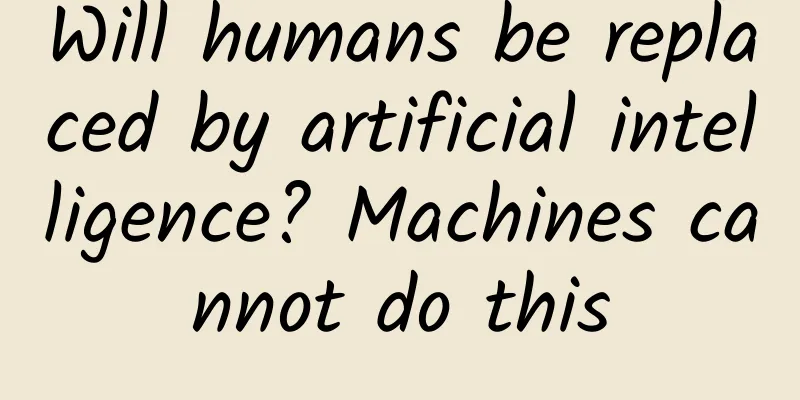Will humans be replaced by artificial intelligence? Machines cannot do this

|
Copyrighted images from the gallery, unauthorized reproduction, please contact the original author In the hot summer of July, the college entrance examination has just passed and the sun is scorching. The hottest social topic at the moment is the college entrance examination application. On the one hand, major universities are carrying out intensive online and offline publicity, and on the other hand, candidates are eager to try their luck in ranking and arranging their positions. It is so lively! With the emergence of a new generation of artificial intelligence (AI) technology products represented by ChatGPT, the impact of AI on education has received great attention from the government, schools to families. AI majors are even more popular among candidates (especially science candidates). However, majors closely related to AI, such as intelligent science and technology, intelligent manufacturing engineering, and data science and big data technology, are limited in the number of schools and enrollments. Not every candidate can be successfully admitted to these majors as they wish. More importantly, candidates need to seize the opportunities of the digital age while meeting new challenges in an all-round way so as not to be eliminated or even abandoned by the times. Copyrighted images from the gallery, unauthorized reproduction, please contact the original author Looking back at the social concerns raised when ChatGPT was first released: Will humans soon be surpassed by intelligent systems? Will many jobs disappear? Will intelligent machines soon become the "masters" of the earth? And so on. In fact, under the hype of major media, these concerns are more or less exaggerated! From the underlying logic, ChatGPT is a content generation tool developed by the American company OpenAI in the field of generative AI. The powerful emergence ability it embodies is supported by massive data, huge computing power and complex algorithms. It is bound to have an impact on occupations dominated by content generation, such as manual customer service, information consulting, knowledge recommendation, etc. However, these are all results derived from the computing paradigm dominated by logical inference, while humans' powerful non-logical inference ability makes machines daunting. More precisely, the imagination, creativity and empathy shown by humans in the process of promoting human civilization are all difficult problems to be overcome in the future to achieve general AI. But it is undeniable that mankind is facing a new historical turning point in the future in terms of scientific discovery methods, technological innovation methods, problem solving methods, work and learning forms, and management and service models. We should firmly believe that future development will inevitably be a pattern of human-machine symbiosis, and carbon-based civilization and silicon-based civilization will work together to compose a symphony of civilization progress. So, at this moment, what principles should we adhere to in the process of promoting economic development and social progress in the digital age? A gentleman is not a tool, but a master of the times. Humans are the masters of the earth. Since the emergence of intelligent systems, the relationship between humans and machines (including tools such as machines and software systems) has always been a master-slave relationship, with the latter being the tools and means of the former. However, with the rapid development of AI technology, modern intelligent systems have gradually emerged with some superpowers that surpass human intelligence, such as the mastery of professional knowledge. The reason why ChatGPT has become a disruptive AI product is that the scope of knowledge it contains has far exceeded the cognition of individual humans, and it has become a "know-it-all" in the world of knowledge. This is the main reason why various institutions and individuals use it as a learning, training and work assistant. It can be said that in the face of the ocean of knowledge formed by generative AI as a technical means, the machine is the "master" and the human is the "slave", which completely subverts the traditional mindset and cognitive mode. At this time, what humans need to do is to learn to ask effective questions to intelligent systems, learn to communicate and interact with intelligent systems correctly, learn to guide and control intelligent systems, and play the role of being able to lead the "bull nose" of intelligent systems, and not be "led by the rhythm" of intelligent systems. Therefore, professional positions such as "problem guidance officer" and "chief interaction officer" will gradually surface and become new professional positions in the future of the digital era. To be competent for these positions, humans need to have open divergent thinking, a broad vision of problems, and flexible wisdom. In other words, let humans free up more time and energy to engage in work that requires strong creativity and rich imagination, and continue to be the spirit of all things. Copyrighted images from the gallery, unauthorized reproduction, please contact the original author People-oriented, value alignment. In the face of the ever-changing digital era, some people advocate that "people are the measure of algorithms". Although AI has developed rapidly in technology and empowered and improved various industries, it has also brought impacts on the entire human society in all aspects: AI ethical issues such as big data killing old customers, algorithm discrimination, and privacy and security have caused concerns, attention and attention from all walks of life, including government officials. In this way, while AI technology is developing, it is urgent to take into account its impact on all mankind, so that AI technology not only has depth in theory and breadth in empowerment, but also needs to have warmth in application, with the vision of seeking human welfare and the development path of aligning with human values, so that the products and services brought by the development of AI technology can benefit mankind and make mankind feel safe, healthy and happy continuously. However, if we reflect on it seriously, AI is, after all, the product of human wisdom. The root cause, breakthrough and even solution of this series of problems require humans to start from themselves. In other words, in today's AI era, the panic, concerns and hidden dangers caused by AI technology make humans urgently reflect on their own shortcomings. The present moment is a critical window and opportunity period. Allowing human ethics and morals to be nurtured in the soil of goodness of the times will surely bring inspiration to the future development of AI ethics and help create a beautiful world of harmonious coexistence between humans and machines. Embrace the times and go with the flow. To get back to the point, contemporary college entrance examination students (of course, this should also include those in compulsory education) should pay attention to the training and improvement of their abilities, thinking, mind and literacy. In terms of ability, with the profession as the carrier, they should be good at integrating theory into practice, focus on the training of innovative ability, learn the path of scientific discovery and invention, and develop a set of hard skills for the development of future careers. In terms of thinking, building a complete set of thinking patterns and laying a solid thinking foundation for future innovation and entrepreneurship is the core element of tempering real kung fu. In terms of mind, cultivate yourself to form a sound and mature personality, so that you can actively align the intelligent system invented by humans with your own value. Literacy is a combination of character, ambition, insight, talent and knowledge. This requires the majority of students to create various conditions to achieve their own all-round development under the condition of adapting to the environment, so that they can respond to changes with constancy, embrace the digital era, and realize a better future. Author: Sun Qiang, Associate Professor of Xi'an University of Technology Review | Qin Zengchang, professor at Beijing University of Aeronautics and Astronautics |
Recommend
Electric Technology Car News: Can a high-end Emgrand GL with a price of 80,000 yuan beat joint venture cars in the compact family car segment?
Emgrand, a name that seems to be full of petty bo...
How to find a Douyin anchor to collaborate with and sell products? Introduction to Douyin cooperation
If merchants have a lot of products that need to ...
Practical Douyin promotion skills, teach you how to play Douyin from scratch!
In the past two years, the traffic dividend has b...
If controlled nuclear fusion cannot be achieved, interstellar travel is impossible? In fact, these are two different things.
Some people believe that nuclear fusion is a hurd...
Two products and five steps to tell you: How to plan topic activities for content-based products
Generally speaking, there are two main purposes o...
Alibaba's Hu Xiaoming: All cars without intelligent Internet of Things will become antiques. AliOS is accelerating the popularization of automotive systems
At the AliOS Summit of the Yunqi Conference, Alib...
"Spring cover-up" is not just about wearing more clothes! If you cover these parts well, diseases will not come to you.
As the saying goes, "cover up in spring and ...
When will the Shanghai epidemic end in 2022 and return to normal? What is the specific list of closed communities? Attached the latest news
Recently, there are still many confirmed cases in...
Fast, accurate, and clear! This "video recorder" can record atoms and molecules!
Author: Luo Huiqian, Researcher, Institute of Phy...
400 times! Talking about the Long March and recalling the past, the blazing red flames towards aerospace
At 8:11 a.m. on December 10, the Long March 4B ca...
The nicknames of the Winter Olympics venues are all about Chinese romance!
The "Water Cube" has been transformed i...
How to delete the negative information in Baidu drop-down box and related searches? How to deal with negative aspects of the company?
If the keywords in the Baidu drop-down box and re...
Changan Automobile's Zhu Huarong: Domestic car companies have no bottom line in their publicity methods, and their partner Huawei is caught in the crossfire
On January 16, Changan Automobile held a global p...
Eight essential tools for Android developers
In the process of Android development, you will e...
Where in China is the winter warm enough not to need heating?
The cold wind is blowing People always yearn for ...









